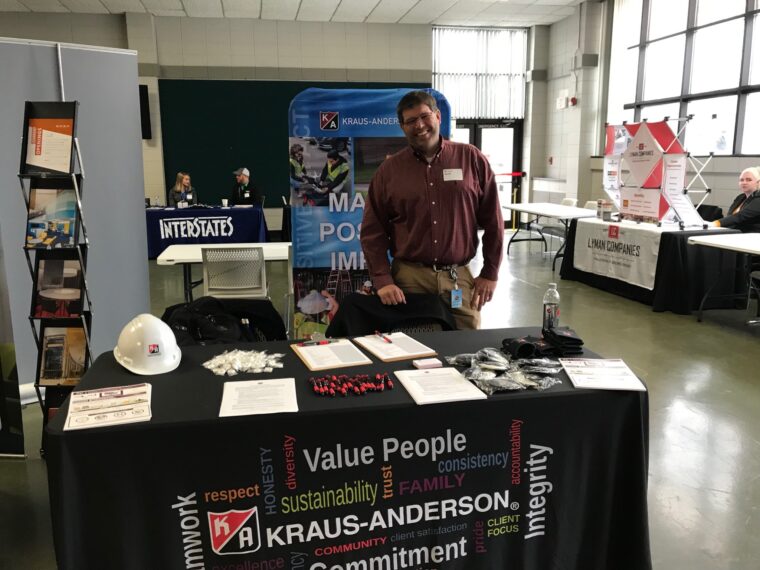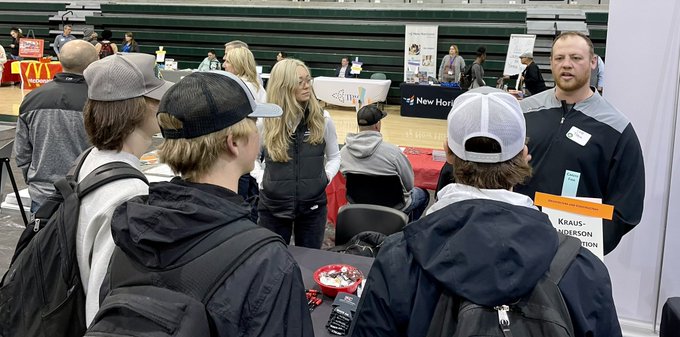The Search for Prospective Talent: Kraus-Anderson’s Career Fair Efforts
By Brenden Nickels, Senior Office Assistant
Imagine this scenario: You’re a college student, and you’re seeking to enter the professional world. But, you don’t know how to approach the job search or connect with organizations. At the same time, a company is looking for fresh, new talent to join its workforce. Fortunately, numerous colleges offer both prospective students and companies the opportunity to network in the form of career fairs.
To learn more about Kraus-Anderson’s career fair efforts, I recently interviewed Director of Talent Acquisition Tim Mayer and Project Managers Ben Pederson (Minneapolis) and Charlie Sweeney (Rochester).
How often do you attend career fairs? Where do you attend career fairs and why?
TM: Since starting our formal campus recruitment efforts in 2004, Kraus-Anderson has attended more than 250 career fairs (~7 per semester). We recruit at nine primary colleges, including the University of Minnesota, Bemidji State University, Minnesota State University-Mankato, North Dakota State University, Dunwoody College of Technology, University of Wisconsin-Madison, University of Wisconsin-Stout, Iowa State University, and Tuskegee University. Since that time, Kraus-Anderson has hired over 190 interns. Forty-five of the interns were hired full-time time, and 30 currently still work at Kraus-Anderson. Our campus partnerships started somewhat organically, primarily based on our regional footprint. We are fortunate to have some of the best Construction Management programs in the country in the upper Midwest. Each year, we focus on strengthening those relationships while also exploring additional campuses to partner with.
Why is attending career fairs important to Kraus-Anderson?
TM: It’s important for Kraus-Anderson to be present, build and showcase our brand, and develop partnerships with the various colleges. We want to show students that we’re an industry-leading builder and an employer of choice willing to invest in their professional development. We hope they see Kraus-Anderson as approachable and as a company that they want to work for. Our people are our best resource and building that pipeline at the entry level is an important part of bringing top talent to Kraus-Anderson.
When attending a career fair, what do you hope to achieve?
TM: The main goals of the campus recruitment program are:
- To build a Talent pipeline of strong PE/Field candidates and future KA Leaders
- To hire top PM and Field talent and assess, train, and develop them into top performers
- To broaden our diverse applicant pool (women, minorities, veterans, etc.)
- To build KA’s employment brand on key campuses and position KA as an “employer of choice” with opportunities to grow and make a positive impact on our company, their careers, and our communities.
We feel the career fair was a success when the above goals are met.
How do diversity, equity, and inclusion play a role in intern talent recruitment?
TM: Kraus-Anderson’s College Internship program is an important pipeline of talent coming into our company. It is critical that we make every good-faith effort to reach and engage a broad pool of diverse, university-level candidates, as they are our future workforce. Additionally, as we all know, having diverse teams and perspectives makes Kraus-Anderson a more innovative and dynamic company.
Does Kraus-Anderson only communicate with college students? How do we interact with high school students?
TM: Kraus-Anderson has a Workforce Shortage Committee with the dual goals of getting more young people interested in construction, both in trades and the office, and increasing participation by underrepresented populations in our workforce. Through these efforts, we have attended over 20 high school career fairs in the past few years, as well as delivered a multitude of construction careers presentations in class and participated in the ACE Mentor Program and Cristo Rey Corporate Work Study Program.
When interns arrive for the summer, what should they expect?
TM: Providing our interns a best-in-class experience, from the time we encounter them on campus until the time they return to school after the summer, helps position KA as a destination workplace and transition our interns into full-time roles. It starts with a thoughtful approach to mentor selection and project placement. The summer begins with an extensive onboarding process, where interns learn more about the company and its leadership. Throughout the remainder of the summer, they work closely with their mentors and department teams to receive first-hand, professional experiences. Additionally, they participate in an intern social outing (last year: Bad Axe), as well as company barbeques and other fun events. At the end of each summer, we ask the interns about their time with Kraus-Anderson, assess our program, and make adjustments to improve each year.
Kraus-Anderson sends a mix of program alumni to each career fair, with the goal of engaging as many students as possible. Our campus teams are trained to identify top talent based on Kraus-Anderson’s Core Values and leadership competencies. Ben Pederson and Charlie Sweeney, both recruited by Kraus-Anderson at career fairs, now represent the company at North Dakota State University and Iowa State University, respectively.
How do you prepare for a career fair?
CS: Tim and his team make sure I am prepared with set-up materials, literature, and giveaways to be able to present well at career fairs. We are briefed on Kraus-Anderson’s internship program and new-hire goals so we can provide students with realistic information. I always feel well-equipped and prepared. As a KA employee, I have a good understanding of the company’s core values and share my personal career experiences and knowledge with the students.
What’s it like representing Kraus-Anderson at a career fair?
BP: I went through the NDSU Construction Management program and representing KA at the University’s career fair is a full-circle moment. I enjoy chatting with the students and showing them firsthand the benefits of completing their intended college courses. There are many job opportunities, and they can be successful in obtaining an internship or full-time position after college.
When trying to find the perfect candidate, what do you look for?
CS: Confidence in how the student presents him/herself is the first thing I notice. Then, based on how long they’ve been in school, I ask about the student’s experience in construction, extracurricular activities, and leadership experience. I pay attention to the questions students ask to make sure they’ve done some research. It’s always great when a student plans good questions and is prepared.
Do you have advice for a student attending a career fair?
BP: Practice your initial greeting when meeting someone new— good eye contact, a firm handshake, and provide a short but interesting introduction about yourself. Time with the representatives will most likely be short, so make a connection early. Be prepared with questions and show enthusiasm.
CATEGORY: Community Involvement

